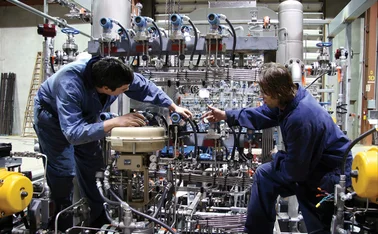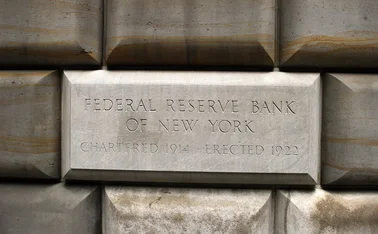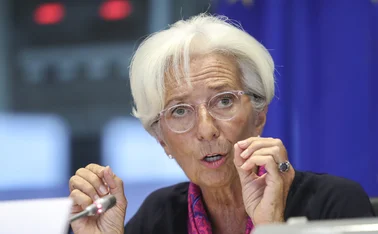
Four decades of economic and trade co‑operation between China and Africa
Huang Yunqing, researcher at the China-Africa Development Fund discusses the economic and trade relationship between China and African countries over the past 40 years, highlighting the mutual benefits that close co-operation has achieved and the opportunities that lie ahead in the ‘new era’ of Chinese politics and power


Over the past 40 years of reform and ‘opening‑up’, China has become the most active driver of economic globalisation and the most resolute defender of a fair international economic order through constantly adapting, adjusting and shaping its relations with the rest of the world. As the ‘ballast’ and ‘booster’ of China-Africa relations, China-Africa economic and trade co-operation have been reinforced, deepened and upgraded over the past 40 years, reflecting the changing relations between China and the global community.
From the 1980s to the 1990s – Establishing a new pattern
China-Africa economic and trade co-operation entered a new chapter following the period of reform and opening-up – especially after the 1990s – indicating China and African countries’ urgent need to seek external support. In a broader international landscape, the end of the Cold War unified the world market, which had been fragmented by differing ideologies, and sped up economic globalisation. It was also a catalyst for rapid development of China-Africa economic and trade co-operation.
In the 1980s, African countries with fragile economic structures were trapped in deep debt crises due to lower international commodity prices, sluggish economic growth, rising trade protectionism and misguided economic policies. Statistics revealed by the World Bank show that, from 1982 to 1988, the total amount of foreign debt in Africa increased from US$140 billion to US$234 billion, with serious deterioration of the debt ratios and debt service ratios. In the 1990s, the majority of African countries established a clear path to industrialisation, which required a great deal of capital investment. It was therefore significant for African countries with extremely limited financial capacity and heavy debt burdens to seek greater external support. At that time, Western countries generally regarded Africa as the ‘hopeless continent’, with the scale of economic aid and investment shrinking, which spurred African countries to turn their eyes to China, which urgently needed to break Western hegemony and ease external pressure. Sharing similar colonised histories leading to national independence, China and African countries have begun a new phase of strengthening economic and trade co-operation building on mutual political trust.
Building on the establishment of the FOCAC
Since the Forum on China-Africa Cooperation (FOCAC) was established in 2000, China-Africa economic and trade co-operation has been advancing in an institutionalised direction. The Chinese government successively launched a series of pragmatic measures to deepen the economic and trade relations between China and Africa, which advanced economic growth and improved people’s livelihoods in Africa, and enriched the fruits of China-Africa co-operation and the significance of this relationship. The successful hosting of the 2006 FOCAC summit in Beijing expanded China’s economic and technical assistance in Africa, strengthened its financial support, boosted the longitudinal transformation of China-Africa economic and trade co-operation from general commodities trading to processing and manufacturing, and achieved the horizontal expansion from project contracting to investments, mergers and acquisitions. According to Chinese official statistics, China’s direct investment in Africa in 2003 was less than US$75 million, with its stock no greater than US$500 million. Following the 2006 FOCAC summit, China’s investment in African nations increased, and in 2007 investment soared to US$1.6 billion, with stock reaching US$4.5 billion.
For more than a decade, with the help of the FOCAC, the integration of mutual interests between China and Africa has continued to deepen the scale of economic and trade co-operation, and new areas of convergence and growth have emerged. As of the end of 2016, trade volume between China and African countries reached US$149.2 billion, which made China the largest trading partner for Africa for eight consecutive years. China’s direct investment stock to Africa reached US$39.9 billion, an increase of 15 times on the previous year. In the first half of 2017, that number reached US$1.6 billion – up 22% from the previous year. Statistics from Johns Hopkins University reveal that China loaned more than US$90 billion to African countries – about 16% of its total overseas loans. International consultancy McKinsey & Company released a report last year highlighting that more than 10,000 Chinese-funded enterprises have invested in Africa. Recently, China has become one of Africa’s most important trading partners and one of the major source countries of loans, while Africa is the second-largest overseas-contracted engineering market and emerging investment destination for Chinese enterprises.
Opportunities and challenges in the new era
Delivering a speech in Tanzania in 2013, President Xi Jinping used the concept of “a community of a shared future for China and Africa” to envision fine prospects for China-Africa co-operation in the ‘new era’ of Chinese politics and power. Railway, highway and regional aviation networks, the advancement of industrialisation, and the “ten co-operation plans” signify that China will continue to increase its support of Africa in various fields including industry, agriculture, finance, infrastructure and public health to promote the transition of China-Africa economic and trade co-operation from resource and product-dominant trade to multidirectional investment and capacity-building co-operation. China will also help African countries speed up the process of industrialisation and enhance their capacity for independent and sustainable development.
China’s Belt and Road Initiative (BRI) is substantively interlinked with the African Union’s Agenda 2063, namely in the shared goal of inclusive growth and common prosperity through equal co-operation and drawing from each other’s strength. Currently, the Chinese government is actively implementing supply-side structural reform, and the adjustment and upgrading of domestic industries will surely further promote international capacity-building co-operation. As Africa equips itself with vast resources and market potential, the acceleration of the industrialisation process of African countries will continue to increase their ability and realise their potential to undertake capacity transfers. As a result, African countries will likely benefit from the BRI. As this initiative has been gradually implemented in Africa, the new pattern of China’s opening-up will become more compatible with the needs of industrialisation of African countries, and China-Africa economic and trade co-operation will surely present more opportunities.
Opportunities, however, often come with challenges. Since the onset of the global financial crisis in 2008, overall world economic growth has been sluggish. Commodity prices have remained stagnant. The African economy, which relied heavily on exports, after experiencing rapid growth, began to slow year by year from 5.8% in 2010 to 3.7% in 2015 and dropped further to 1.7% in 2016 – the lowest level in almost 20 years. In the meantime, large-scale investment in infrastructure and productive sectors through borrowing money in a period of rapid growth again led to a rapid rise in debt among African countries. According to World Bank statistics, the current total amount of foreign debt in Africa has exceeded US$500 billion, and debt crises have surfaced in Mozambique and Zimbabwe. The huge pressure on debt repayment will, in the short term, undermine the macroeconomic governance and financial health of African countries, and hinder economic restructuring and diversified development in the medium and long term, thus posing a challenge to the sustainable development of China-Africa economic and trade co-operation.
Currently, the industrialisation of Africa remains at an unstable juncture. Realising this goal overnight is not possible because of the continent’s weak industrial foundation and the undiversified economic structure in most African countries. China, as one of the most – if not the single most – important economic partner of Africa, has used its own experience in reform and opening-up to aid African countries in establishing industrial systems, improving their industrial layout, achieving leapfrog development and further integrating with the international community, and contributing to and participating in globalisation. This is not merely China’s solemn commitment to Africa, but also an important practice of how China will shape its relationship with the outside world once it has established itself as the second-largest global economy – before becoming first in the near future. Considering this, the blueprint of economic and trade co-operation between China and Africa in the new era that will be set out at the Beijing Summit of the FOCAC in 2018 is significant.
Only users who have a paid subscription or are part of a corporate subscription are able to print or copy content.
To access these options, along with all other subscription benefits, please contact info@centralbanking.com or view our subscription options here: subscriptions.centralbanking.com/subscribe
You are currently unable to print this content. Please contact info@centralbanking.com to find out more.
You are currently unable to copy this content. Please contact info@centralbanking.com to find out more.
Copyright Infopro Digital Limited. All rights reserved.
As outlined in our terms and conditions, https://www.infopro-digital.com/terms-and-conditions/subscriptions/ (point 2.4), printing is limited to a single copy.
If you would like to purchase additional rights please email info@centralbanking.com test test test
Copyright Infopro Digital Limited. All rights reserved.
You may share this content using our article tools. As outlined in our terms and conditions, https://www.infopro-digital.com/terms-and-conditions/subscriptions/ (clause 2.4), an Authorised User may only make one copy of the materials for their own personal use. You must also comply with the restrictions in clause 2.5.
If you would like to purchase additional rights please email info@centralbanking.com test test test







